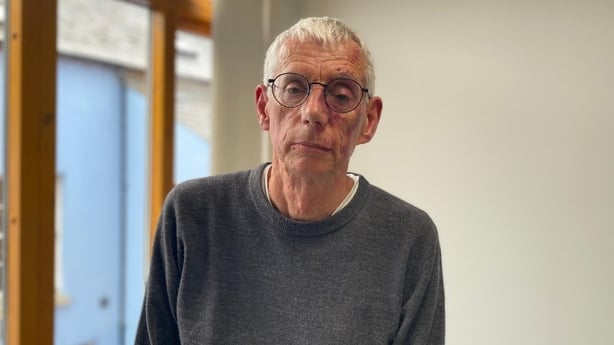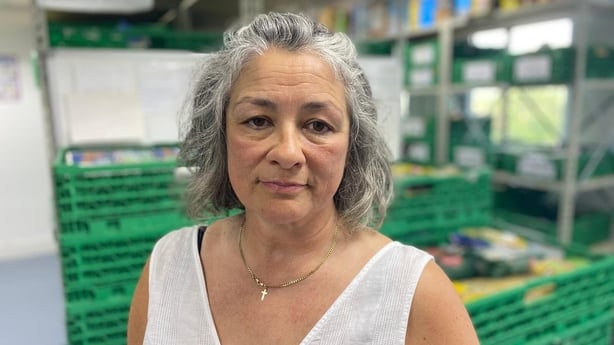The received wisdom is that life is cheaper in the North. Saturday afternoons in Newry still bring shoppers from the south in pursuit of a good bargain.
But after a tumultuous few years featuring Brexit, the pandemic and a cost-of-living crisis, how has that hit the pockets of people in the North?
Can it really be said life is less expensive there?
Eamonn Connolly, manager of Newry Business Improvement District, said visitors from the south consistently account for 25% of footfall in the town.
"What we have noticed is a difference in the volume of the purchases. We're seeing larger volumes of purchase, looking for value around multi-buys."

Mr Connolly recently carried out the same grocery shop on both sides of the border and did not find a huge difference in price. He said people come north to get very specific items like baby products, cleaning products and alcohol.
Minimum unit pricing was introduced in the Republic in 2022 but has yet to happen in Northern Ireland. It means a retailer cannot sell alcohol below a certain price, based on the amount of alcohol in the product.
Mr Connolly said this has increased the drinks sales in Newry "exponentially".
"Our alcohol sales have grown; I couldn’t even quantify the growth. There would be quasi-industrial scale purchasing going on. So we would have quite a lot of people coming up buying purely alcohol."
Does he think certain bargains to be had up North lead southerners to think the cost of living is lower there?
"I think there’s that misconception. It’s not cheaper, and there are higher incomes in the south and higher benefits. Yes, core costs for a lot of things up here are cheaper, but it’s not that simplistic, it’s nuanced."
Aside from day trippers, a mortgage adviser in Newry has noticed an increase in people from the south seeking to make a permanent move there.
"It’s not entirely huge numbers," said Anthony Reavey.
"But we have noticed over the last few years that people with no connection to the North whatsoever are contacting us to find out is it possible to get a mortgage in the North."
He cites a current example of a three-bed semi-detached house in Co Louth on the market for €385,000. A similar house is going for €255,000 in Newry.
"That’s a difference of around €130,000, for similar houses approximately 12 miles apart. I think that tells its own story," he said.

Mr Reavey said there are multiple factors accounting for the difference in price, but one of the main ones is higher salaries in the Republic.
"Anyone who’s buying in the North but working in the south is kind of getting the best of both worlds, where they’re getting lower property prices but benefitting from higher wages."
Read more: Our Lives in the North
Over the past decade or so, wage rates in the Republic have averaged around a third higher than the North. While in recent years the cost of living has been significantly higher in the Republic, this accounts for only some of the gap in wages.
"We are still suffering from the Troubles to a large extent," said Paul Gosling, an author and economic researcher based in Derry.
Mr Gosling said the economy outside Belfast has "never really strengthened".

Mr Gosling said one of the big issues is that not enough people are in third level education, which means the technical and academic skills needed for the economy in Northern Ireland are not there. Additionally, many people go to Britain for university and do not return.
Despite lower wages, it is still within reach for many people in the North to afford to buy their own home; house prices have not reached anywhere near the levels of many parts of the south.
At the same time, securing housing in the North is becoming increasingly difficult for many people. There is a shortage of homes. Housebuilding is at a 60-year low, and there is nowhere near enough social housing to meet demand. That has pushed more people into the private rental market.
Rents have risen sharply, by almost 10% in the past year.
Michelle Proudfoot has just returned to Belfast after seven years in England and found the housing landscape has changed. She said the rent for a house she lived in nine years ago has now doubled, but her wages have only slightly increased.
Consequently, Michelle, her partner and their toddler moved in with her grandfather.
"If we were to move out and rent somewhere, it would be living pay cheque to pay cheque, no chance of saving," she said.
"I just kind of feel trapped, I might never have a place of my own. It’s put everything on hold for us."
Childcare costs in NI among highest in Europe - research
On top of housing costs, childcare costs have become like a "second mortgage" for many young families in the North.
According to a survey carried out by the group Employers for Childcare, the average cost of a full-time childcare place for one child in Northern Ireland is €11,900 per year.
The most recent statistics available for the Republic put the figure at €9,300.
Research from Ulster University in 2020 suggested childcare costs in Northern Ireland are among the highest in Europe.
Parents can use some supports like tax credits, but until very recently there was no scheme in place for free childcare, unlike in England where 30 hours are offered per week.
Becca Harper is a mother and co-founder of the group Melted Parents NI, which aims to draw attention to high childcare costs and advocate for change.
She said her childcare is £65 per day for her two-year-old. She is pregnant with a second child and made the decision to apply for voluntary redundancy at her full-time job, as she calculated childcare for two children would be £1,200 per month.

Ms Harper said she never thought she would be in the position of having to leave the workforce, but said she is contacted regularly by women who are making the same decision due to unaffordable childcare.
"It’s the corner I’ve been backed into, and it’s a shame, because the government are starting to listen and they are starting to invest in childcare, but actually for a lot of women in the North it’s already too late as they’ve already been priced out of work because of childcare costs."
When the government in the North got up and running again in 2024, it said childcare was going to be a top priority. In September a new subsidy scheme came into force, so parents with children under primary school age are now getting some financial relief.
Childcare is an economic infrastructure - it means parents can be fully active in the labour market. Limited childcare in the North is a factor in its unusually high level of economic inactivity. This means people who are not in paid work and not looking for work.
Paul Gosling said economic inactivity is a huge problem for Northern Ireland.
"It is a drag on the economy and one of the factors for our low rate of productivity, because you’re pulling a dead weight of so many people that are unable to work."
"So it leads to higher levels of subvention which comes out of London, and it means we haven’t got the same economic drive you might otherwise have."
Economic inactivity is linked to increased poverty.
At South-West Belfast Foodbank, manager Edel Diamond has seen a change in the profile of some people coming to it for help.
"We’ve seen people who own their own homes, maybe a home with two wage earners, and for some reason they can’t make ends meet. They might have bills or need a car for work. With the recent cost of living crisis, people are finding they’ve gone through their savings, there’s no disposable income anymore."

Many of the people Ms Diamond encounters at the food bank are on benefits. She describes the benefits system in Northern Ireland as "Dickensian".
She said people are often not able to cover essentials as the benefit for a single person is around £80-£90 per week.
"What you’ve got to do out of that is feed yourself, clothe yourself, put electric on. The big problem was the rise in energy prices. It's a much-used phrase, but it was a choice between heating your home or eating.
The cost-of-living crisis appears to have hit the vulnerable hard across these islands.
At 24%, child poverty is on the rise in Northern Ireland, although it’s lower than the UK as a whole.
Meanwhile, more than one in five children in the Republic are living in households where they can’t afford basic items like shoes.
Overall, there is no straightforward answer to whether people are better off in the North or south.
There are many factors involved, and it is difficult to draw direct comparisons - the way data is collected, and the choice of metrics used by economists means there are not always comparable statistics.
And we don’t know what the future holds. The long-term impact of Brexit on the North is unclear. In the Republic, it remains to be seen how the economy might be affected were multinational companies to pull out.
Paul Gosling said the question of who is better off, north or south, largely depends on personal circumstances.
"It depends on your job and region. But that does mean, if you’re someone like me, self-employed and earning money that’s based around London and Dublin wage levels, then you can actually have a very good quality of life in Northern Ireland."
Our Lives in the North is a six-part podcast series from RTÉ Radio 1, available on the RTÉ radio app or wherever you get your podcasts.






